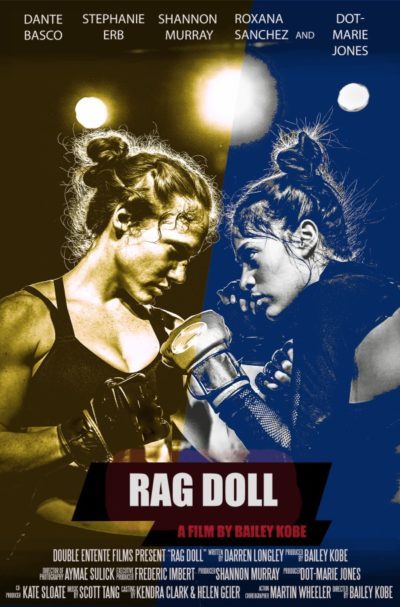 This gritty and action-packed series was originally marketed in seven volumes. The new edition condenses that to four, by combining the first six into three and designating each component in the pair as either Part 1 or Part 2, the original title of each Part 1 serving as the new book title for both. So this book counts as two series installments. That’s a felicitous arrangement, because installments 1-2 (now paired as Real Dangerous Girl) and 3-4 here both fit together nicely as two self-contained two-part story arcs, each featuring protagonist/narrator Kim but centering on a different challenge each time, that starts in Part 1 and finds its resolution in Part 2. But the books should be read in order; here, references are made to persons and events from the prior installments, and in order to fully understand who Kim and her wheelchair-bound kid brother Donnie are, their situation, and the development of her character, you really need to have read the preceding part of the canon. Warning: this review will contain “spoilers” for the previous book(s).
This gritty and action-packed series was originally marketed in seven volumes. The new edition condenses that to four, by combining the first six into three and designating each component in the pair as either Part 1 or Part 2, the original title of each Part 1 serving as the new book title for both. So this book counts as two series installments. That’s a felicitous arrangement, because installments 1-2 (now paired as Real Dangerous Girl) and 3-4 here both fit together nicely as two self-contained two-part story arcs, each featuring protagonist/narrator Kim but centering on a different challenge each time, that starts in Part 1 and finds its resolution in Part 2. But the books should be read in order; here, references are made to persons and events from the prior installments, and in order to fully understand who Kim and her wheelchair-bound kid brother Donnie are, their situation, and the development of her character, you really need to have read the preceding part of the canon. Warning: this review will contain “spoilers” for the previous book(s).
As I’d deduced and mentioned in my review of installment 1 (I read and wrote about the first two as separate books: what is now Real Dangerous Girl Part 1 and Part 2), the setting is an unnamed city in western New York state. It’s not named here either; but references to docks and ocean-going commerce point to Rochester, which is on Lake Ontario and can access the Atlantic via the St. Lawrence River. Several months have passed since the end of the previous book; it’s now winter. One reference suggests that Kim’s still 17; but she has to be getting pretty close to 18. (A credibility problem with the series is that it’s hard to fit all of her backstory into 17 years.) We’re not actually brought up to speed on the intervening events until Chapter 3, and Kim’s wry description of her new line of work as “killing people” might give the idea that she’s been working as an assassin. She hasn’t –but she has opted to make her living with her .357 rather than her calculator; and as she recognizes, the possibility of lethal violence is always present, especially given the sort of people who’ll employ her.
 At Cole’s funeral, a meeting with Curt, an old acquaintance of his that he’d recommended her to, led to a three-month gig in “security” for one Mr. Falcone, another mobster like her former employer, who now prefers to be called Mr. Falcon since he’s looking to shed his Mafia image; also like the late Mr. McIntyre, he’s moving to position himself as more plausibly “legitimate.” (So “security” work for him involves dealing with his double-crossing employees, and attacks by thugs working for his equally shady rivals.) Near the beginning of this book, she’s invited to join his personal bodyguard team, where a sudden vacancy has opened up. But the way it opened up isn’t encouraging…. Since there are a couple of more books in the series, we know that our girl’s going to make it home at the end of the day. But she doesn’t have any such assurance, and the chances of this job ending with a tag on her toe look pretty real. She needs the money, though, since failing to provide for Donnie isn’t an option she’ll accept; and she’s about to face another unexpected existential threat to her little family unit, from a totally different quarter.
At Cole’s funeral, a meeting with Curt, an old acquaintance of his that he’d recommended her to, led to a three-month gig in “security” for one Mr. Falcone, another mobster like her former employer, who now prefers to be called Mr. Falcon since he’s looking to shed his Mafia image; also like the late Mr. McIntyre, he’s moving to position himself as more plausibly “legitimate.” (So “security” work for him involves dealing with his double-crossing employees, and attacks by thugs working for his equally shady rivals.) Near the beginning of this book, she’s invited to join his personal bodyguard team, where a sudden vacancy has opened up. But the way it opened up isn’t encouraging…. Since there are a couple of more books in the series, we know that our girl’s going to make it home at the end of the day. But she doesn’t have any such assurance, and the chances of this job ending with a tag on her toe look pretty real. She needs the money, though, since failing to provide for Donnie isn’t an option she’ll accept; and she’s about to face another unexpected existential threat to her little family unit, from a totally different quarter.
As noted above, Kim’s character is developing, and not always in ways that please her. (In fact, some developments concern and scare her.) The criminal underworld she originally entered unwittingly when she landed a job with McIntyre’s now defunct organization has become pretty much her default environment. That’s partly because no legitimate business will hire her as an accountant with no formal credentialling, even if she’s good at it, but also because, though she doesn’t like to admit it to herself, at one level she thrives on the excitement, empowerment and adrenaline rush of life in warrior mode; and she takes fierce pride in being equally good at that. Thanks to Cole’s training, she’s a very accurate, quick-reflexed markswoman, and strong and agile despite her petite stature. (And she can now kill without batting an eye –though that’s a development she fully realizes is problematical.) This career choice puts her on a tightrope between the demands of her job and her moral instincts; the tension of walking it can make her cry and vomit at times. Shades of grey often define her alternatives; there’s a lot of food for thought here in terms of moral reflection, as there often is in this genre. That’s implicit in the story, though, not embodied in explicit struggles in Kim’s mind; survival generally dictates her choices, and the one here that many readers will most intensely disagree with and disapprove of is one she makes instantly and without having to agonize over at all. (Having a family of my own, I totally understand why she doesn’t have to.)
There’s no sex, licit or illicit, in this book (or the prior installments). Kim’s not without interest in sex; but like most teens, she sees herself as unattractive. She’s never pursued a relationship, and she’s taken to heart Cole’s advice that the best option for a hired gun is celibacy. (Though given that he was in a long-term relationship with a live-in girlfriend, he failed to practice what he preached.) Compared to the prior installments, there’s an increase in bad language here, including some use of the f-word and religious profanity, though Jeter’s use of it is still restrained compared to many writers who depict this milieu. (Kim’s own language isn’t as bad as that of her colleagues, though if I were her dad I’d still call her on some of it.) In fairness, given the kind of characters we’re dealing with, the language isn’t unrealistic. Violence comes with this territory; several people here exit the world with bullets in their bodies (some of them by Kim’s hand). But none of them are particularly nice people who would elicit any tears from the average reader; I can safely promise that “no innocents were harmed in the writing of this book.” :-)
In terms of literary quality, this is a highly gripping and emotionally evocative read, and a fast-paced one. Depiction of well-drawn, nuanced characters is one of the author’s strengths; Kim herself is a vital bundle of three-dimensioned nuance, but all of the cast here come to life. (Most aren’t especially likable, except for Donnie and Mae, but I do like Kim and root for her, despite her rough edges; Jeter lets me understand where she’s coming from, and her narrative voice makes me empathize with her.) There’s also more of a mystery element here than in the previous story arc, though I still classify this as action-adventure rather than mystery. It has to be said, though, that this book isn’t as well crafted as the preceding. There are editorial issues, some minor. but several more serious. In places details, plot elements and conversations are inconsistent with things written before, which can fray (though not break) the thread of the plot. (The worst of these is where a character dies in one chapter, but reappears alive in the next one!) That cost the book a star; but I’d still recommend it to all readers of the first book (though not as the starting point for the series). And I most definitely intend to follow the series to its completion!
Author: K. W. Jeter
Publisher: Lincoln Square Books; available through Amazon, both for Kindle and as a printed book.
Book 2 of 4 in the Kim Oh series, containing previously available titles Real Dangerous People and Real Dangerous Place.
A version of this review previously appeared on Goodreads.
 There are spells where I find myself going through a stream of mediocre movies, wondering when I’ll see something genuinely good. Then, I stumble into the likes of this, which leaves me yearning for the heady delights of mediocrity. It was in trouble right from the start, with five minutes of opening voice-over that did nothing but leave me confused. Then again, if your story requires five minutes of opening voice-over in the first place, you should probably rethink your storytelling techniques. The same could be said for a post-apocalyptic scenario in which food is in short supply, yet black pleather cat-suits are apparently easily available, in a range of sizes to fit all needs.
There are spells where I find myself going through a stream of mediocre movies, wondering when I’ll see something genuinely good. Then, I stumble into the likes of this, which leaves me yearning for the heady delights of mediocrity. It was in trouble right from the start, with five minutes of opening voice-over that did nothing but leave me confused. Then again, if your story requires five minutes of opening voice-over in the first place, you should probably rethink your storytelling techniques. The same could be said for a post-apocalyptic scenario in which food is in short supply, yet black pleather cat-suits are apparently easily available, in a range of sizes to fit all needs.




 This gritty and action-packed series was originally marketed in seven volumes. The new edition condenses that to four, by combining the first six into three and designating each component in the pair as either Part 1 or Part 2, the original title of each Part 1 serving as the new book title for both. So this book counts as two series installments. That’s a felicitous arrangement, because installments 1-2 (now paired as Real Dangerous Girl) and 3-4 here both fit together nicely as two self-contained two-part story arcs, each featuring protagonist/narrator Kim but centering on a different challenge each time, that starts in Part 1 and finds its resolution in Part 2. But the books should be read in order; here, references are made to persons and events from the prior installments, and in order to fully understand who Kim and her wheelchair-bound kid brother Donnie are, their situation, and the development of her character, you really need to have read the preceding part of the canon. Warning: this review will contain “spoilers” for the previous book(s).
This gritty and action-packed series was originally marketed in seven volumes. The new edition condenses that to four, by combining the first six into three and designating each component in the pair as either Part 1 or Part 2, the original title of each Part 1 serving as the new book title for both. So this book counts as two series installments. That’s a felicitous arrangement, because installments 1-2 (now paired as Real Dangerous Girl) and 3-4 here both fit together nicely as two self-contained two-part story arcs, each featuring protagonist/narrator Kim but centering on a different challenge each time, that starts in Part 1 and finds its resolution in Part 2. But the books should be read in order; here, references are made to persons and events from the prior installments, and in order to fully understand who Kim and her wheelchair-bound kid brother Donnie are, their situation, and the development of her character, you really need to have read the preceding part of the canon. Warning: this review will contain “spoilers” for the previous book(s). At Cole’s funeral, a meeting with Curt, an old acquaintance of his that he’d recommended her to, led to a three-month gig in “security” for one Mr. Falcone, another mobster like her former employer, who now prefers to be called Mr. Falcon since he’s looking to shed his Mafia image; also like the late Mr. McIntyre, he’s moving to position himself as more plausibly “legitimate.” (So “security” work for him involves dealing with his double-crossing employees, and attacks by thugs working for his equally shady rivals.) Near the beginning of this book, she’s invited to join his personal bodyguard team, where a sudden vacancy has opened up. But the way it opened up isn’t encouraging…. Since there are a couple of more books in the series, we know that our girl’s going to make it home at the end of the day. But she doesn’t have any such assurance, and the chances of this job ending with a tag on her toe look pretty real. She needs the money, though, since failing to provide for Donnie isn’t an option she’ll accept; and she’s about to face another unexpected existential threat to her little family unit, from a totally different quarter.
At Cole’s funeral, a meeting with Curt, an old acquaintance of his that he’d recommended her to, led to a three-month gig in “security” for one Mr. Falcone, another mobster like her former employer, who now prefers to be called Mr. Falcon since he’s looking to shed his Mafia image; also like the late Mr. McIntyre, he’s moving to position himself as more plausibly “legitimate.” (So “security” work for him involves dealing with his double-crossing employees, and attacks by thugs working for his equally shady rivals.) Near the beginning of this book, she’s invited to join his personal bodyguard team, where a sudden vacancy has opened up. But the way it opened up isn’t encouraging…. Since there are a couple of more books in the series, we know that our girl’s going to make it home at the end of the day. But she doesn’t have any such assurance, and the chances of this job ending with a tag on her toe look pretty real. She needs the money, though, since failing to provide for Donnie isn’t an option she’ll accept; and she’s about to face another unexpected existential threat to her little family unit, from a totally different quarter. Joan is always a figure who has the potential to be co-opted into other times and locations. Recently, we reviewed
Joan is always a figure who has the potential to be co-opted into other times and locations. Recently, we reviewed 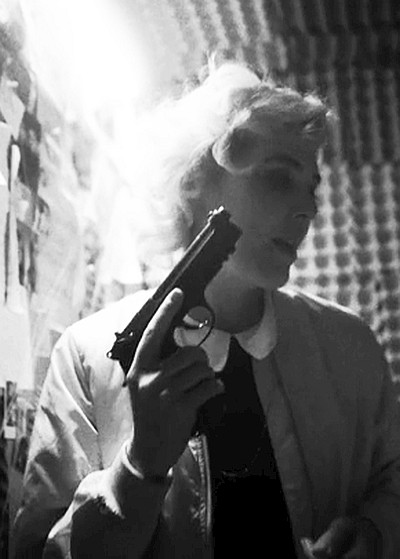
 I did not originally expect to be reviewing this here. I watched it because of the technical elements, which I’ll get to in a bit. However, by the end, it does qualify – though you certainly wouldn’t think so from how things begin. It gets underway with Lili (Puig) waiting for a date arranged over the Internet with Eduardo (Alcantara). He shows up late, very apologetic after having been mugged, and having had his phone taken, but is utterly charming, and the chemistry with Lili is immediate. They end up back at his place for dinner. But as he’s cooking on the kitchen, the tone of the evening changes, when she hears his supposedly stolen phone going off in his jacket…
I did not originally expect to be reviewing this here. I watched it because of the technical elements, which I’ll get to in a bit. However, by the end, it does qualify – though you certainly wouldn’t think so from how things begin. It gets underway with Lili (Puig) waiting for a date arranged over the Internet with Eduardo (Alcantara). He shows up late, very apologetic after having been mugged, and having had his phone taken, but is utterly charming, and the chemistry with Lili is immediate. They end up back at his place for dinner. But as he’s cooking on the kitchen, the tone of the evening changes, when she hears his supposedly stolen phone going off in his jacket…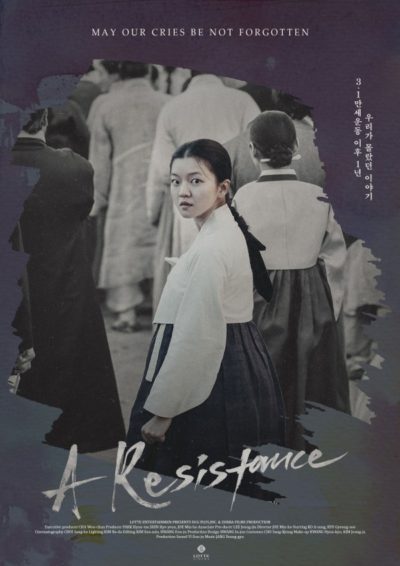 This takes place in 1919-20, when Korea was under occupation by the Japanese [there seems to be quite a lot of this about; I’ve seen a bunch of Chinese movies set when that country was occupied by Japan as well]. Even demonstrating against the Japanese, or in favour of Korean independence, was sternly forbidden, with those taking part likely to be arrested and thrown in prison for months. If they were lucky, that is: an opening caption tells us 7,500 were killed in the protests or died in jail subsequently. Even for those merely arrested, this was not a “nice” prison, to put it mildly, with horrendously over-crowded conditions (24 to a cell!), freezing temperatures and meagre rations.
This takes place in 1919-20, when Korea was under occupation by the Japanese [there seems to be quite a lot of this about; I’ve seen a bunch of Chinese movies set when that country was occupied by Japan as well]. Even demonstrating against the Japanese, or in favour of Korean independence, was sternly forbidden, with those taking part likely to be arrested and thrown in prison for months. If they were lucky, that is: an opening caption tells us 7,500 were killed in the protests or died in jail subsequently. Even for those merely arrested, this was not a “nice” prison, to put it mildly, with horrendously over-crowded conditions (24 to a cell!), freezing temperatures and meagre rations. This is set around fifty years after “the Provocation”, a series of unsolved mass abductions which led to Capernica becoming a strictly-controlled hierarchical society of Uppers, Lowers and the Military. Orphan Jaclyn Holloway is a Lower, living in near poverty in the seaside town known as Settlement 56. The only way out for a Lower is to pass the stringent test which allows entry into the Military. On graduating from the local school,
This is set around fifty years after “the Provocation”, a series of unsolved mass abductions which led to Capernica becoming a strictly-controlled hierarchical society of Uppers, Lowers and the Military. Orphan Jaclyn Holloway is a Lower, living in near poverty in the seaside town known as Settlement 56. The only way out for a Lower is to pass the stringent test which allows entry into the Military. On graduating from the local school, 
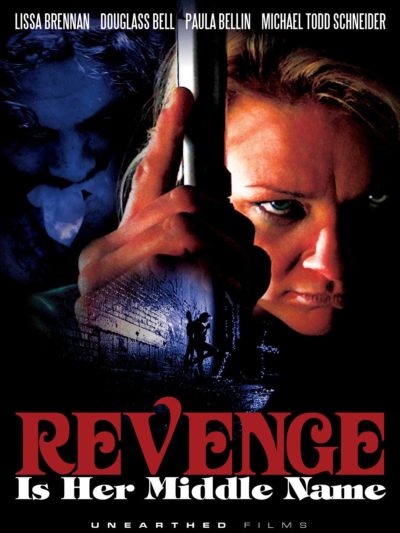
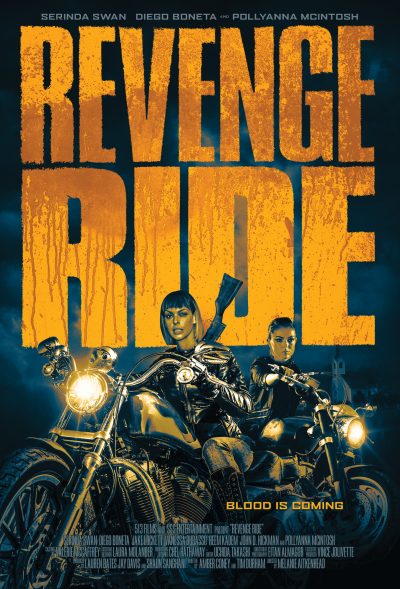 Mary (Dubasso) is drugged and raped by three members of the football team at a college party. Believing neither the college authorities nor the police will do anything, she turns to cousin Maggie (Swan) for help, because her relative is a member of the all-female Dark Moon motorcycle gang (eloquent slogan: “Eat my pussy”). Run by Trygga (McIntosh), they take revenge on the rapists, branding their catchphrase on the perpetrator’s asses, and leaving them in full view on the college campus. The fraternity boys don’t take this kindly, and strike back, causing things to escalate towards an all-out war. Complicating matters are Maggie’s increasing feelings for Brian (Boneta), one of the team, though uninvolved in the rape.
Mary (Dubasso) is drugged and raped by three members of the football team at a college party. Believing neither the college authorities nor the police will do anything, she turns to cousin Maggie (Swan) for help, because her relative is a member of the all-female Dark Moon motorcycle gang (eloquent slogan: “Eat my pussy”). Run by Trygga (McIntosh), they take revenge on the rapists, branding their catchphrase on the perpetrator’s asses, and leaving them in full view on the college campus. The fraternity boys don’t take this kindly, and strike back, causing things to escalate towards an all-out war. Complicating matters are Maggie’s increasing feelings for Brian (Boneta), one of the team, though uninvolved in the rape.